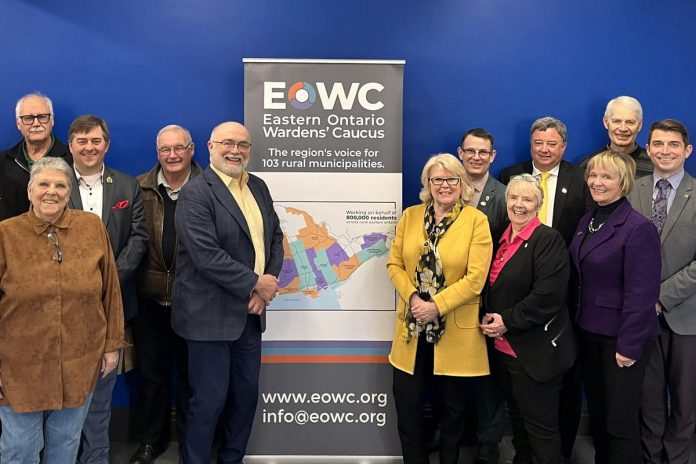
In counties including Northumberland, Peterborough, and Haliburton, more housing, better access to health care, and the need for a bigger government investment in infrastructure are common themes.
The Eastern Ontario Wardens’ Caucus (EOWC), which represents small urban and rural municipalities across eastern Ontario, has identified those areas among its highest priorities as it shapes its 2024-2027 strategic plan.
The EOWC expects those three strategic priorities will guide its decision-making and advocacy focus for the next three years.
“Reliable infrastructure systems and facilities to foster growth, a range of housing options that are affordable and meet the needs of all people, and access to health care services are critically important to people living, raising families, and building businesses in eastern Ontario,” said Peter Emon, EOWC chair, in a media release.
“This strategic plan is a blueprint for ensuring that we all work together to ensure those needs are met for residents of rural eastern Ontario, now and into the future.”
The EOWC said it’s committed to working with all tiers of government, business operators, and community leaders to ensure people across eastern Ontario’s small urban and rural communities are equipped “to thrive.”
The strategic plan outlines the EOWC’s approach to each priority.
1. Infrastructure
- Advocate for continued and necessary investment in provincially and federally owned and controlled infrastructure.
- Create flexible and adaptive policies to enable its municipalities and the Ontario government to unlock capacity and build innovative infrastructure solutions.
- Invest in municipal infrastructure that provides predictable, fair, evidence-based funding to allow municipalities to plan and create economic environments that foster growth.
- Invest in infrastructure that supports an environmentally sustainable economy.
2. Housing
- Continue to advocate for alternative funding to assist Eastern Ontario municipalities to plan and develop housing and related infrastructure.
- Make programming more equitable by advocating for the expansion of the parameters for funding eligibility and allocation across all municipalities.
- Develop and recommend flexible and adaptive housing policies to enable eastern Ontario municipalities and the provincial government to build innovative housing solutions.
3. Health care
- Undertake an environmental scan to measure what municipalities are spending directly on health care and to access related trend data and forecasting.
- Provide evidence-based feedback and data to inform government decisions around long-term care, paramedic services, public health, and the evolution of Ontario health teams. The EOWC will incorporate social determinants of health to map out impact.
- Educate the public and continue to advocate for adequate and sustainable funding to support the delivery of health care services and to ensure the long-term viability of the health care system.
According to the EOWC, a fourth strategic priority is strengthening the organization’s impact by ensuring its work is informed by research and an evidence-based approach. It will also continue to develop its collaborations and partnerships “that move the needle” on issues impacting eastern Ontario.
Communicating strategically and effectively on multiple levels with the government and key partners and members and providing effective and strategic leadership are also critical in the coming years, the EOWC said.
The EOWC is a non-profit organization advocating for 103 small urban and rural municipalities across eastern Ontario. The caucus covers an area of 50,000 square kilometres, serving 800,000 residents.
“For more than 20 years, the EOWC has gained support and momentum by speaking with a united voice to champion regional municipal priorities and work with the government, businesses, non-profit organizations, Indigenous leaders, the media, and the public.”
Peterborough County’s warden, Bonnie Clark, is the vice-chair of the EOWC. She told kawarthaNOW earlier this year the key issues in Peterborough County are — similar to the EOWC — health care and housing.
Providing more housing and increasing access to primary care physicians and health-care professionals are two top priorities for 2024, Clark said.
“We have 4,000 housing starts in the next couple years just in the county, so we are doing our share here in the county with severances and different subdivisions going,” Clark said.
Across the EOWC’s region, there are approximately 12,000 to 14,000 units on municipal community rental housing wait lists, EOWC figures noted.
“People are waiting an average of almost five years and up to 10 years in some cases to access these community rental housing units,” according to the EOWC.
In the health care realm, Peterborough County recently welcomed aboard a health care advancement coordinator with the aim to drive physician recruitment efforts and advocate for a community health centre in the county.


























